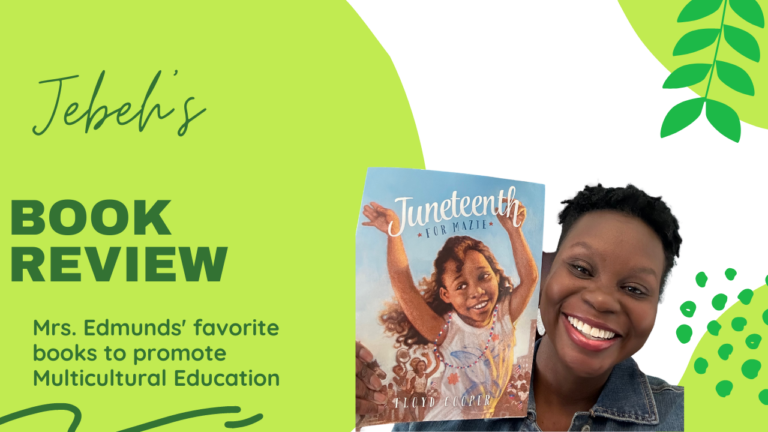Welcome back to my blog. This book is excellent for students to understand the historical significance of the holiday of Juneteenth. And the title of this book is called Juneteenth for Mazie, and it’s written and illustrated by Floyd Cooper. I picked this book because Floyd Cooper is a fantastic artist. In his words about this little girl staying up late getting ready for the big celebration of Juneteenth and how her father sits her down and talks about her great grandparents that were slaves. And I quote, great, great grandpa, and great, great grandma, mosey and how they crossed into liberty, a lot of formerly enslaved people when it was around this time, right after the Civil War.
This was this vast celebration of liberation when we were all freed two years after the Emancipation Proclamation, and that’s how it became on June 19, hence Juneteenth. And so the story talks about her ancestors, showing pictures and depictions of them in the fields, looking up at the North Star, and trying to envision a life of freedom and solitude. And it just gave them that freedom of bondage and liberation and peace. What I love about this is this story, it goes back to that fateful day in Galveston, Texas, when that announcement was made, and it shows how African Americans weren’t even. They weren’t even recognized as Americans at this time and were shouting and jubilation in celebrating, and they knew they had a long road ahead. What I wanted you to share with your students when you are reading this book is to talk about how the misconception that once the slaves were free, everything was all right. Everything was perfect. Everybody was equal.
The story opens up this discussion that it took years, and many things aren’t equal even today. And so I would be grateful if you could read this book. It talks about how from that emancipation time, after Juneteenth, how people still African Americans voted, lobbied the cross the Edmund Pettus Bridge Bloody Sunday events, you know, it has a beautiful timeline depiction of why Juneteenth should be celebrated and why it should be remembered, and showing the descendants of those formerly enslaved people and how they forgave how they moved forward, and how they excelled and achieved. They became heroes and quote, so it’s just a beautiful book. It talks about celebrations with Strawberry Pop. I will challenge educators to examine the historical significance of why African Americans drink Strawberry Pop and have red velvet cake on Juneteenth. That’s a bonus question for you. And that’s something that you all can look up.
Trust me, there are some delicious recipes for red velvet cake, but there’s a historical significance to that.
There are so many books about Juneteenth and many great picture books out there, and I will have my favorite list of Juneteenth books and antiracist books that you can start getting into your libraries. And I found through my work alongside the Duluth Area Chamber of Commerce; they also partnered with a local independent bookstore. And I will also put in the link below—their list of curated books in honor of Juneteenth. So, my challenge for you is to find out after you read the book Juneteenth for Maisie about the historical significance of Strawberry Pop, as we say in the Midwest, pop or soda if you’re not from Minnesota—the historical importance of red velvet cake that’s my challenge for you. So happy Juneteenth, take the time to go out. There are lots of events this weekend coming up.
I know in Duluth, Minnesota, where I live, we have two events. Everybody is welcome to attend in honor of Juneteenth by our local African American chapters and affinity groups. You don’t have to be a bipod person to rebel and celebrate liberation for all people. And I also wanted to share with you that we have lots in store with Jebeh cultural consulting. I have a digital course on my website if you would love to learn more self-paced work in your cultural competency game and understand people in my lived experience, how we navigate, and how we can be better authentic colleagues and neighbors with our BIPOC friends. Be sure to share this blog post with anybody you think is interested in diversity, equity, and inclusion, as well as friends interested in more culturally diverse literature for their students and their children.
